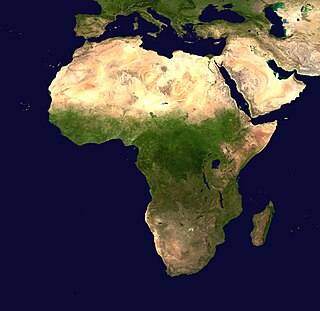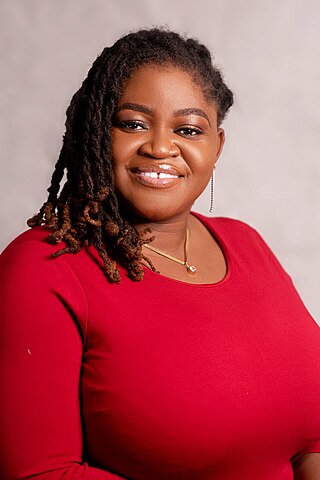Related Research Articles
The Association for Progressive Communications (APC) is an international network of organizations that was founded in 1990 to provide communication infrastructure, including Internet-based applications, to groups and individuals who work for peace, human rights, protection of the environment, and sustainability. Pioneering the use of ICTs for civil society, especially in developing countries, APC were often the first providers of Internet in their member countries.
The Green Belt Movement (GBM) is an indigenous grassroots organization in Kenya that empowers women through the planting of trees. It is one of the most effective and well-known grassroots organisations addressing the problem of global deforestation. Professor Wangari Maathai established the organization in 1977 under the auspices of the National Council of Women of Kenya (NCWK). GBM's successes in forest conservation, education, and women's economic empowerment have gained the organisation worldwide acclaim. It is also noted for its advocacy of human rights, democratisation of access to public lands, and environmental justice issues such as the role of women's traditional ecological knowledge in addressing environmental degradation and desertification.

Youth empowerment is a process where children and young people are encouraged to take charge of their lives. They do this by addressing their situation and then take action in order to improve their access to resources and transform their consciousness through their beliefs, values, and attitudes. Youth empowerment aims to improve quality of life. Youth empowerment is achieved through participation in youth empowerment programs. However scholars argue that children's rights implementation should go beyond learning about formal rights and procedures to give birth to a concrete experience of rights. There are numerous models that youth empowerment programs use that help youth achieve empowerment. A variety of youth empowerment initiatives are underway around the world. These programs can be through non-profit organizations, government organizations, schools or private organizations.
Womankind Worldwide is a UK-based, feminist global women's rights organisation that works in solidarity with women's movements around the world to bring about lasting change in women's lives. Founded in 1989, Womankind partners with women's movements in Africa and Asia to support them in their efforts to change discriminatory laws and policies, challenge gender norms and stereotypes, and provide transformative programmes and services to women and girls.

Women of Uganda Network (WOUGNET) also known as Women of Uganda Network Development Limited is Ugandan non-governmental organization that aids women and women's organisations in the use and access of information and communication technologies (ICTs) to share information and address issues their concerns such as gender norms, advocating for their rights and building communities and businesses through education.

The International Center for Research on Women (ICRW) is a non-profit organization with offices in Washington, D.C., United States, New Delhi, Ranchi, and Jamtara, India, Nairobi, Kenya, and Kampala, Uganda. ICRW works to promote gender equity, inclusion and shared prosperity within the field of international development.

African feminism includes theories and movements which specifically address the experiences and needs of continental African women. From a western perspective, these theories and movements fall under the umbrella label of Feminism, but this categorization is misleading for many branches of African "feminism". African women have been engaged in gender struggle since long before the existence of the western-inspired label "African feminism," and this history is often neglected. Despite this caveat, this page will use the term feminism with regard to African theories and movements in order to fit into a relevant network of Wikipedia pages on global feminism. Because Africa is not a monolith, no single feminist theory or movement reflects the entire range of experiences African women have. African feminist theories are sometimes aligned, in dialogue, or in conflict with Black Feminism or African womanism. This page covers general principles of African feminism, several distinct theories, and a few examples of feminist movements and theories in various African countries.

Women in Kazakhstan are women who live in or are from Kazakhstan. Their position in society has been and is influenced by a variety of factors, including local traditions and customs, decades of Soviet regime, rapid social and economic changes and instability after independence, and new emerging Western values.
Gender inequality in India refers to health, education, economic and political inequalities between men and women in India. Various international gender inequality indices rank India differently on each of these factors, as well as on a composite basis, and these indices are controversial.

The Millennium Development Goals Achievement Fund (MDG-F) was an international cooperation mechanism committed to eradicating poverty and inequality and to accelerating progress towards the Millennium Development Goals (MDGs) worldwide. Its aim was to improve livelihoods and to influence public policy, which made it responsive to the needs of the poorest populations.

Ilwad Elman is a Somali-Canadian social activist. She works at the Elman Peace and Human Rights Center in Mogadishu alongside her mother Fartuun Adan, the NGO's founder. She was voted the African Young Personality (Female) of the Year during the 2016 Africa Youth Awards.

Women's empowerment may be defined in several method, including accepting women's viewpoints, making an effort to seek them and raising the status of women through education, awareness, literacy, equal status in society, better livelihood and training. Women's empowerment equips and allows women to make life-determining decisions through the different societal problems. They may have the opportunity to re-define gender roles or other such roles, which allow them more freedom to pursue desired goals.

Fatuma Abdulkadir Adan is a Kenyan lawyer and peace ambassador. She is a recipient of the Stuttgart Peace Prize.

Alexia Hilbertidou is a New Zealand social entrepreneur and the founder of GirlBoss New Zealand, a social enterprise which aims to empower women in leadership, entrepreneurship, science, technology, engineering and mathematics.
Olaoluwa Abagun is a Nigerian lawyer, feminist, and a Vocal Girls' Rights Advocate, nurturing a dynamic generation of African Girls. She is the Founder of the Girl Pride Circle Initiative, a notable girl NGO situated in Nigeria, she holds the position of Executive Director at ATHENA, a global feminist network dedicated to promoting gender equality and upholding human rights

Njideka Françoise Harry is a World Economic Forum Schwab Foundation for Social Entrepreneurship Fellow.
Women in Tech Africa (WiTA) is an organization with a focus on entrepreneurship expansion and multiplying the numbers of females in technology, especially in Africa. It was founded by Ethel D Cofie. Over the years, WiTA has strategically focused on enabling women to drive Africa's growth story and create an impact on personal life through technology. Currently, its target audience comprises aspiring female tech entrepreneurs between the ages of 18 and 40. Women in Tech Africa is the largest group on the continent with membership across 30 countries globally with physical chapters in Ghana, Malawi, Zimbabwe, Somaliland, Germany, Ireland, Kenya, Tanzania and Mauritius.
Women Forward (WF) is a South African political party founded aimed at uplifting women and advocating for women's rights.

The COVID-19 pandemic has had a considerable impact on female education. Female education relates to the unequal social norms and the specific forms of discrimination that girls face. In 2018, 130 million girls worldwide were out of school, and only two out of three girls were enrolled in secondary education. The COVID-19 pandemic may further widen the gaps and threatens to disrupt the education of more than 11 million girls. In addition, girls are less likely to have access to the Internet and online learning.

Osasu Edobor is a Nigerian gender advocate and founder of Think Help Restore (THR) Media and the Safe Space Initiative. She is a licensed mental health first-aider, peer educator trainer, and counselor. As a campaigner for gender inclusion, Osasu created the HERFessions app, which provides support for survivors of sexual abuse. She is a 2018 Mandela Washington Fellow alumna and a Young African Leaders Initiative member.
References
- ↑ "The Department of Education is proud to endorse this inspirational programme and encourages national participation from all stakeholders and role-players." Hindle (2007), Letter to Jeffrey Hedberg
- ↑ Accenture, "Inclusion and Diversity: Programs, cites "The Encyclopaedia of Brands and Branding in South Africa in collaboration with The Sunday Times" for this quote.